When you want to scale your business and work better and better it’s normal looking for the best SEO tools for your business.
Actually SEMRUsh is one of the favourite tools of SEOs due to its power and strength. Its keyword research is very effective since it has a database with millions of keywords.
But not everyone can afford this tool due to its high cost, especially those who start in the world of SEO or agencies that are still small.
That’s why today we bring you cheaper tools than SEMRush for you to work SEO with the same effectiveness.
Table of pricing of all Semrush competitors
Semrush “Pro” plan costs $139.95 per month, the “Guru” plan is $249.95 per month, and the “Business” plan is $499.95 per month.
Perhaps these prices are too high for you. So, here I show you some alternatives, some cheaper and others with a similar price.
| SEO tool | Price/month (cheapest plan) |
|---|---|
| DinoRANK | $31 |
| SE Ranking | $65 |
| Powersuite SEO | $29 |
| SERPStat | $100 |
| Ahrefs | $129 |
| Spyfu | $39 |
| MOZ | $49 |
| Majestic | $49,99 |
| Ubersuggest | $49 |
Some of these tools have a free plan forever but with limited features or with all features but for a limited time.
It’s a good opportunity to test these tools and decide which one is the best for you.

Alternatives & competitors that worth a change
In this post you find out alternative tools more affordable than Semrush and with similar functions.
We think you can find the perfect tool for you and, if that is not the case, you can keep using SEMRush, of course.
Let’s go there!
Semrush vs DinoRANK
DinoRANK is an all-in-one SEO tool that performs very similar functions to SEMRush but is priced five times less. This software of Spanish origin has reached the market with a lot of energy and a different proposal.
DinoRANK’s philosophy is to democratize SEO, i.e. to make SEO accessible to everyone. That is why this tool is very easy to use thanks to its clean and intuitive interface.
However, this does not mean that its functions are reduced.
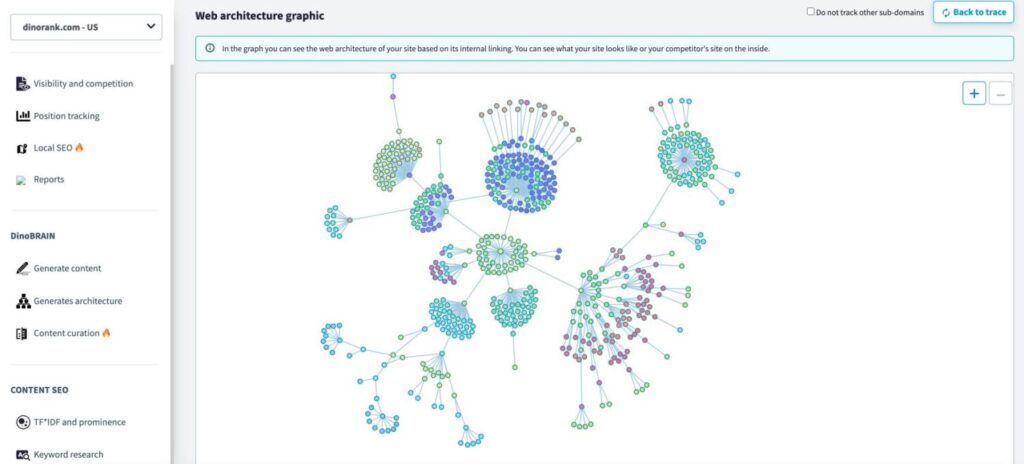
One of its most interesting features is undoubtedly “Internal Pagerank”. Thanks to it you can check in a graphic made with balls how the internal authority of the URLs of a website is distributed.
This function links to “Internal Linking” so that you can know at a glance how to link your URLs for an optimal distribution of link juice.
Dinorank also allows you to detect problems in your texts such as thin content or cannibalization.
Finally, it also has functions focused on managing external linking to monitor your link building strategy.
Its internal linking graphs are intuitive and easy to read even by non-experts.
You can track your most relevant keywords daily and check their evolution in the SERPs
Thanks to its semantic prominence feature, you will know which words to include in your content based on those used by Google’s top 10 around a keyword.
- You can generate SEO optimized content with its DinoBRAIN AI Module, just by giving it a seed keyword.

-
If you work in an agency with many large projects, DinoRANK may be small for you.
-
Its link building features aren’t too powerful yet
-
As a young tool, the websites record does not go back very far.
Semrush vs SE Ranking
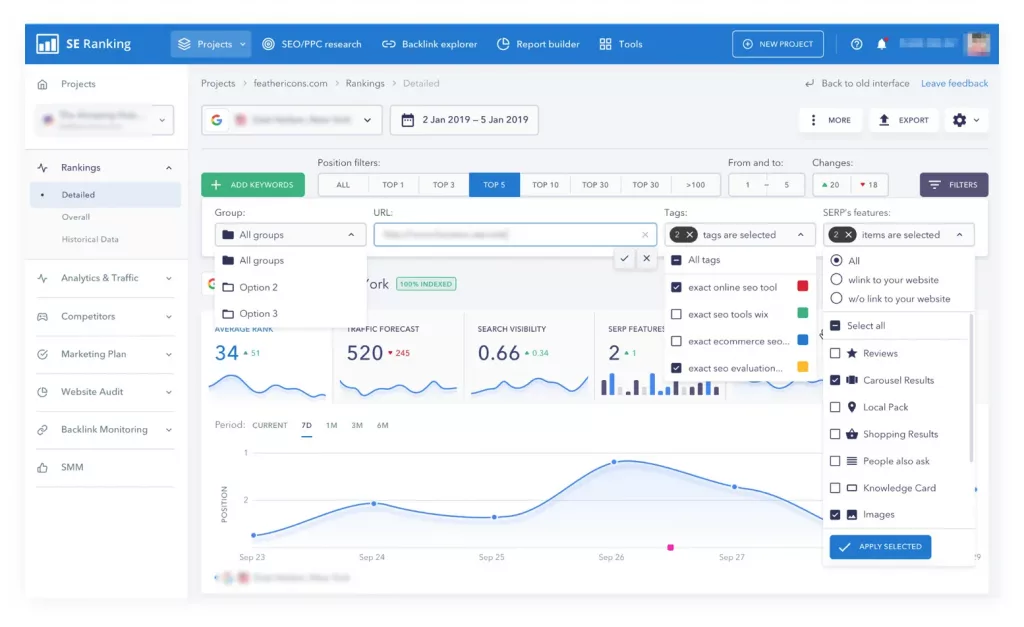
This is a cheaper alternative if you compare it with Semrush: only €23 per month and you will get a all-in-one SEO tool with functions that will allow you to manage the ranking of your website.
Although it is still a newborn tool, it has a database with 2 billion keywords. For this reason, the Keyword Research function is the most valued among all those offered by SE Ranking.
But SE Ranking has other functionalities to work on the SEO of your website: SEO audit, SERPs monitoring, backlink monitoring, PPC research, etc.
In addition, it’s a very useful tool to analyze the competitors in depth: the keywords they are ranking, their progress in the SERPs and their SEO strategies.
Another advantage of SE Ranking is the creation of personalized reports that will help you to work easily with the information.
-
Allows you to manage keywords by grouping and segmenting them
-
Use more than ten factors to qualify your backlinks
-
It recommends changes to improve SEO
-
It has no writing-related functions
-
It does not have learning aids such as tutorials or a blog
-
It’s a bit slower than other tools
Now let’s analyze and compare Semrush with other powerful tools on the market:
Semrush vs Powersuite SEO
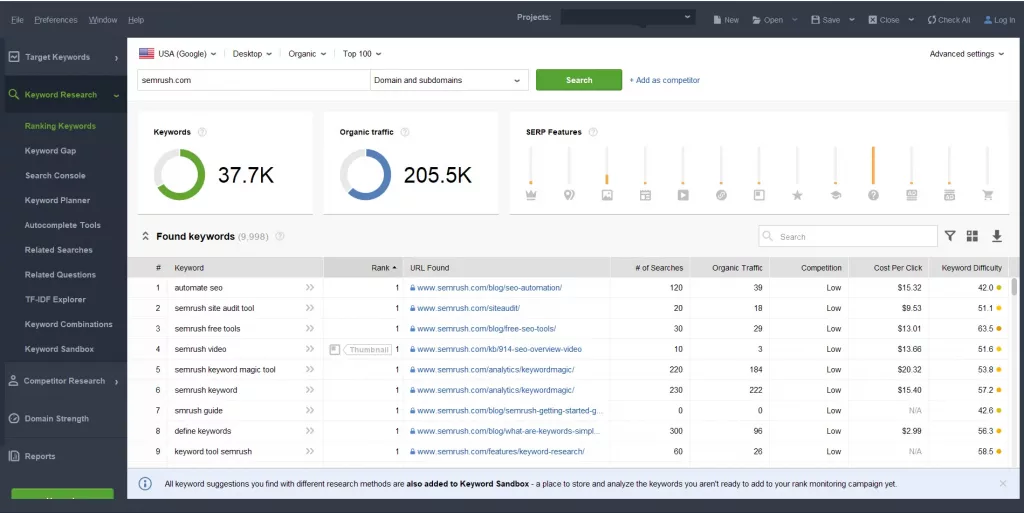
More than five million of SEOs work with Powersuite SEO. This software consists of five different and specialized tools to delve into different aspects of SEO.
All of these tools have been developed and improved over the twelve years that Powersuite SEO has been available, the same time as Semrush.
Its functions will not only help you with your own or your clients’ websites, but will also allow you to analyse your competitors’ websites.
One important feature of Powersuite SEO is its capacity to detect black hay backlinks that could damage you in the future. Thanks to this information you can disavow these links and avoid a Google penalty.
Their reports look great visually and you can print or download them to study the information and make decisions about your next steps.
With the free version you can use all functions but you cannot download the data.
-
It has a link assistant that will look for new opportunities of link building like comments, reviews, guest posting…
-
It compares up to 40 websites at the same time that compete with your site
-
It adapts to algorithm changes and keeps update
-
It’s a software installed in the computer so you need a strong and fast machine. In addition, you will have to install it on all the computers on which you want to use the tool.
It can be a bit complex than Semrush because it’s a set of five tools, that is, five interfaces and not only one.
-
The constant updates requires lot of space in the computer
Semrush vs SERPStat
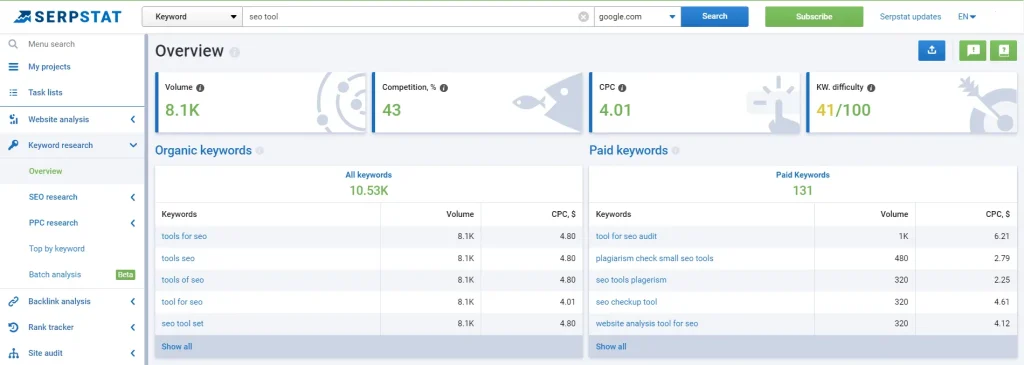
The strengths of SERPStat are its ease of use and the power of its Keyword Research tool.
Although it has a much smaller domain base than Semrush, the truth is that it’s still quite powerful since it provides information on 180 million domains (Semrush has 840 million).
In addition, this tool stands out for the visual clarity with which it displays the data. In this respect it is much simpler than Semrush, which has a larger learning curve.
You can work with SERPStat from the first day and get results and information. If you need more help, you can go to the Academy section to see some tutorials and get some help.
It even has a YouTube channel with videos explaining the interface and the main features and functions of the tool.
SERPstat offers eight pricing plans, making it more versatile than Semrush. All these options allow you to test by switching from one plan to another until you find the one that best suits your needs and your way of working.
- It shows new keywords opportunities through competitor analysis in the top 10 of Google.
- His tool Batch Analysis allows you to compare up to 200 domains at the same time
- It tells you which pages are most relevant to a specific keyword
- SERPStat doesn’t have backlink monitoring function
- It doesn’t have social media tracking or writing tool (SEMRush does)
- The keyword database is limited.
Semrush vs Ahrefs
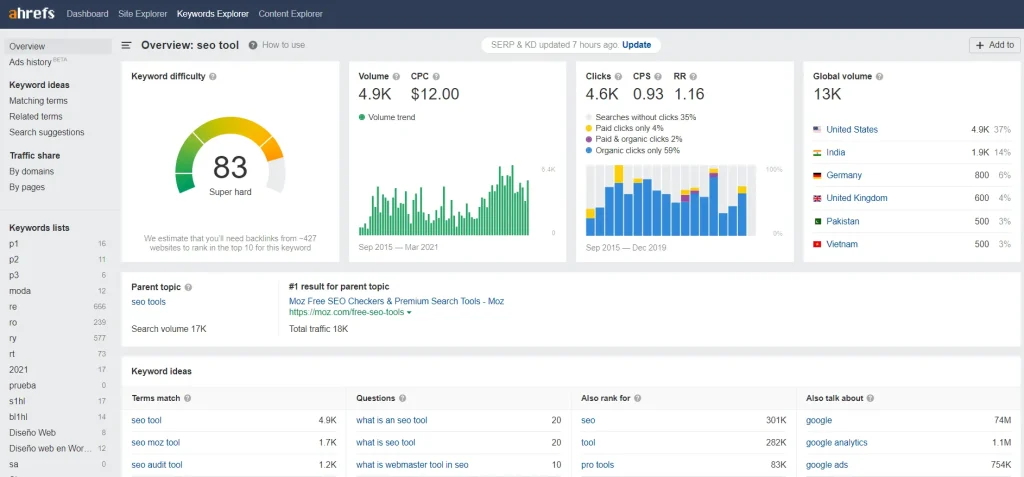
Ahrefs is without doubt one of the most known Semrush competitor. They share a lot of functions but Ahrefs offers a few bonuses and is constantly updating and improving.
Its interface can be confusing, especially for non-experts, but it can be learned with practice. Ahrefs has a great capacity to crawl websites and has the largest link database so it’s perfect for link building.
This tool does such a detailed analysis of backlinks that it will be able to tell you what you are doing wrong in your link building strategy so that you can correct your mistakes.
Ahrefs allows you to track the keywords of your interest and set up alerts, something that you can also do with those of your competition.
In addition, Ahrefs can perform SEO On Page audits in great depth, although it is not yet at the level of SEMRush. Anyway, some Ahrefs features make up for it. It can also detect cannibalization.
Pricing is based on the number of projects and users you need so you can scale the plan as your business scales.
- All keyword and organic traffic data is presented in a clean, easy-to-read dashboard.
- Ahrefs tells you how many backlinks you need to improve the ranking for a certain keyword.
- There is an add-on for Chrome and Firefox that allows you to use Ahrefs directly on the website you are visiting.
- Ahrefs doesn’t have so many keywords metrics as Semush (competitive density, trends…)
- There isn’t integration with Google Analytics so you won’t have reports from this tool.
- Web traffic statistics are not as accurate as Semush or other tools.
Semrush vs Spyfu
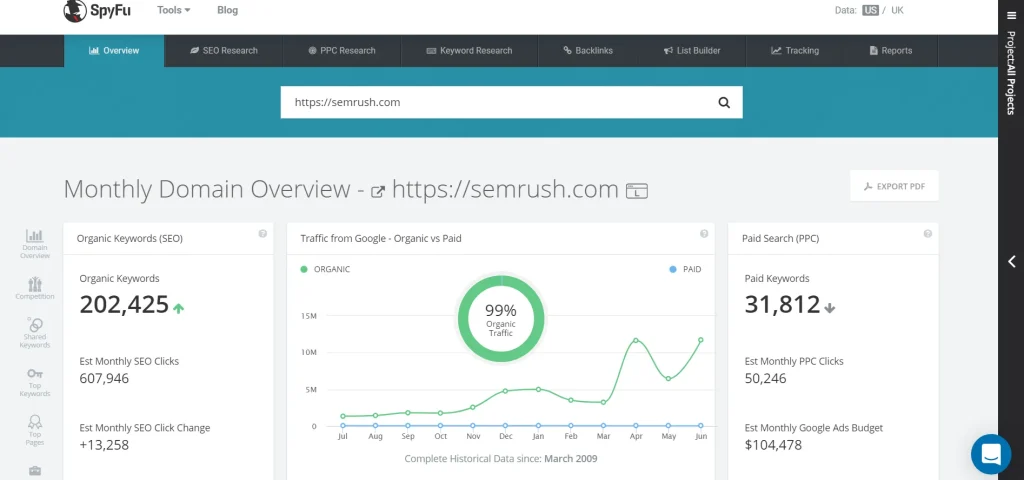
This eloquent named tool specializes in spying on competitors. This is also SEMRush’s strongest point, so we have some interesting competition here.
Spyfu has a clear interface where you can view various competitor analytics and understand their strategies.
In addition, Spyfu allows you to view competitors’ Google Ads spend and their backlinks.
But you can use this tool in several ways. Besides spying on your competitors, you can detect the influencers in your sector to get backlinks or spread your content.
Another positive point of this tool is that it provides a lot of information in great detail and presents it in reports and graphs that are very easy to understand, even for non-experts.
We want to highlight the Take The Negative Match feature: the tool compares the ROI of your keywords with that of your competitors and tells you which of them you can discard because they are not profitable.
- You can get unlimited search results with the most expensive plans; Semush is always limited.
- Competitors’ data in Spyfu goes back as far as 20 years, so you can get a very broad historical view of your competitors’ track record.
- You can access resources and tips (more than 200 video-tutoriales) to learn how to make the best use of the tool.
- Spyfu loses focus when analyzing your own website
- It doesn’t analyze traffic or backlinks; Semush does
- The keyword search tool is too simple and has no filters or suggestions like Semush
Semrush vs MOZ Pro
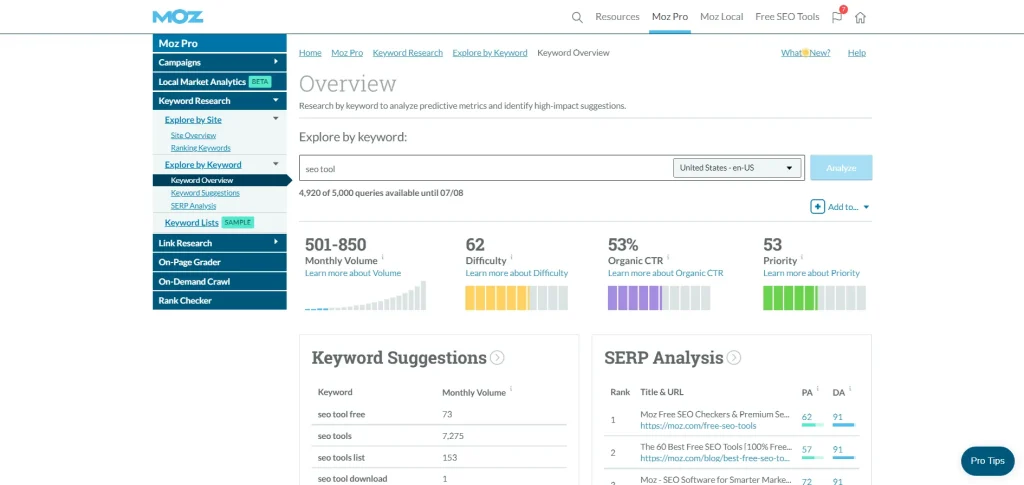
Moz is one of the most popular SEO tool thanks to its famous metrics, PA (Page Authority) and DA (Domain Authority), and the Moz-bar, a free addon for analyzing websites, viewing link building techniques and increasing visibility and traffic.
It’s a tool with three strengths: keyword research (Keyword Explorer), content marketing and analysis of competitors (Open Site Explorer). In addition, the control panel is easy to use so Moz is perfect to non-experts.
Moz helps you to detect weaknesses in your website and the aspects you need to improve in order to achieve a higher ranking than your competitors.
Many of Moz’s features are available for free, but with limitations, so you can try them out before deciding to pay for a subscription.
- The Keyword Research and backlink research tools are fully usable in the free version.
- You can see the metrics PA and DA only with de Moz Bar for Chrome or Firefox.
- Each week Moz will send you updates about your website: duplicate content, 404s, etc.
- Payment features are not as powerful as Semrush’s
- It doesn’t pay too much attention to technical aspects like site speed
- It doesn’t have much force analyzing the competition
Semrush vs Majestic
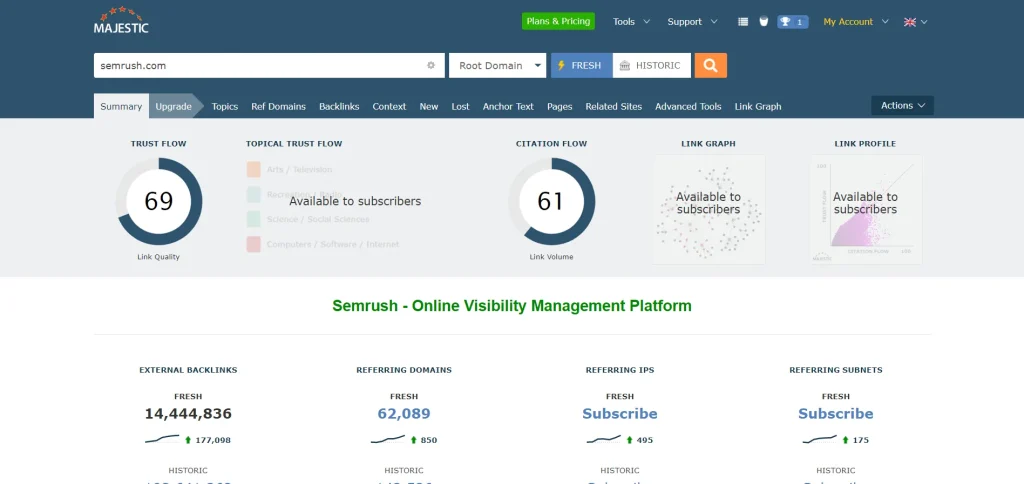
Majestic is one of the most powerful tools for analyzing backlinks. It also has a tool to explore websites with a high level of depth.
Thanks to Majestic you can discover new keywords and find posibles issues to fix in your web. This way, you will improve your domain authority and visibility and get more organic traffic.
Although Majestic is an all-in-one seo tool, it really specializes in link building. If your SEO strategy relies on this, Majestic can be of great help to you.
It has a huge backlink database for a lot of reliable information that you can use to study the link building strategy of your competitors.
Using the Backlink Profile History feature, you can analyze the link profile of up to five competitors and see what strategy they have followed to increase their organic traffic. Then you can replicate it to get those results.
You can also analyze all the links that a URL receives to find out which ones can be harmful or dangerous for your website and avoid penalties from Google.
In addition, Majestic has its own metrics to evaluate the profile of a website based on the quality of its backlinks, something that doesn’t exist in Semrush
- Its Clique Hunter function lets you know which websites are linking to your competitors but not you.
- Its backlink database is larger than Semrush’s
- It can create customized reports with all the information
- Compared to Semrush, its traffic analysis and keyword research tools are weak
- The graphs in the reports can be difficult to interpret for inexperienced users.
- Links sometimes disappear from the backlink history
Semrush vs Ubersuggest
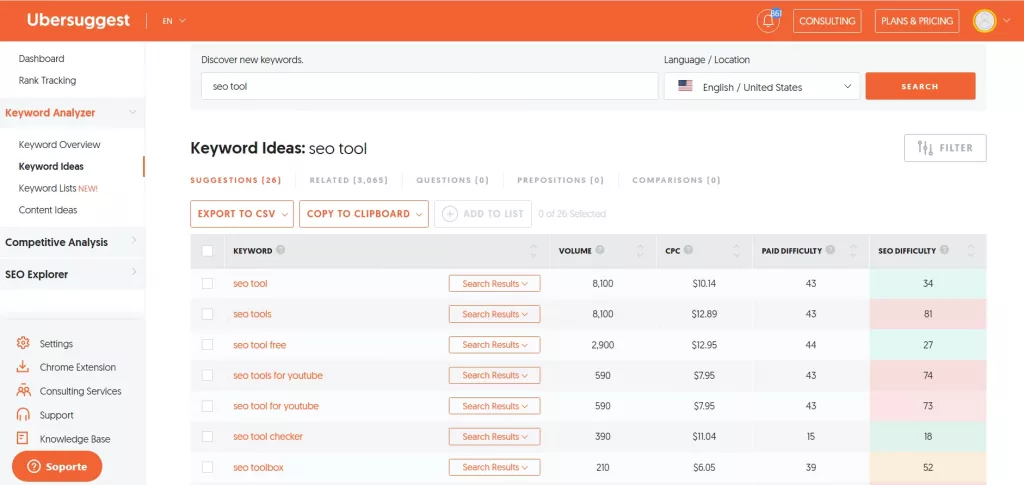
If you need to perfom a Keyword Research you probably already know Ubersuggest, the tool owned by Neil Patel.
Ubersuggest provides you with the main functions you need to manage your website’s SEO such as keyword research, link analysis or site audits, although in a simple way compared to Semrush.
Semrush also has functions dedicated to social media analysis, paid advertising and content, so it also has a marketing focus.
One point in Ubersuggest’s favor is that you can use their Keyword Research tool for free although with a limit. If you are just starting out in the world of SEO it can be useful for you until you can afford a subscription to a tool.
Ubersuggest’s SERPS analysis includes Google’s top 100 for a keyword and the number of backlinks and domain score for each website.
- It is very user friendly and its interface is clean and clear
- It is frequently updated by adding new functionalities
- It is more affordable than Semrush and it also has a 7-day free trial period so you can make a decision
- It doesn't track actions in social networks
- It doesn't allow the generation of customized reports with the data obtained
- It doesn't have the same technical muscle as Semrush nor its depth of analysis.
Final conclusions Semrush vs other SEO tools
SEMRush is the brightest star in the SEO tools universe but it has two problems: high prices and difficult to use.
Anyway, even if you have the resources to use Semrush and have learned how to use it, it's still convenient to see what other SEO tools are offering.
As you see, there are SEO tools with functions and features that are missed in Semrush and maybe, they fit better with your strategy.
Decide which functions are primordial to you and, then, choose the SEO tool that help you the most. You can take advantage of free trials for making a better decision.


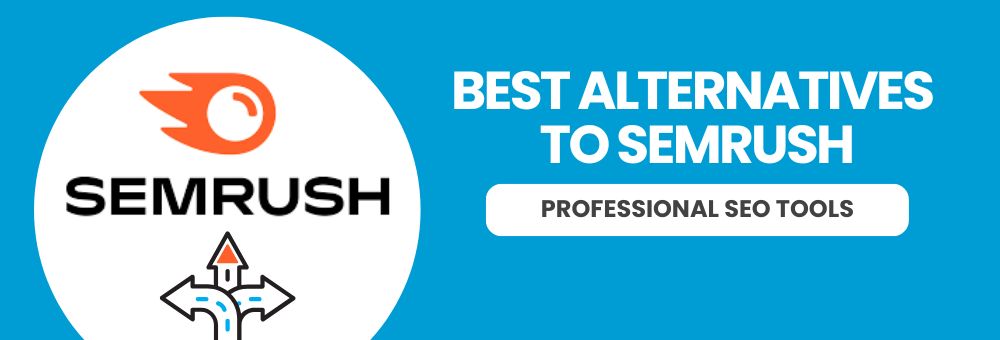
2 comments
hunufa akter
Great post! It’s so true that while SEMrush is a top-tier tool with powerful capabilities, the cost can be a hurdle for small businesses and beginners in SEO. SEMrush’s extensive keyword database and in-depth analytics make it an industry favorite, but it’s reassuring to see that there are more affordable alternatives that still deliver effective results.
For anyone just starting out or running a smaller agency, exploring budget-friendly options is a smart way to build SEO skills and get solid insights without a big financial commitment. Often, these alternatives offer specialized features that cater to specific SEO needs, like keyword research, backlink analysis, or on-page audits, which can be perfect for someone who doesn’t need every premium feature right off the bat.
Looking forward to learning about the other tools you’ve recommended. It’s so helpful to know that SEO success doesn’t always have to come with a hefty price tag!
Ismael Ruiz
Hi Hunufa, it is true that Semrush is a powerful SEO tool, but its high price is one of the main reasons why more and more people decide to look for alternatives.
I hope you can try all the ones we mentioned, especially DinoRANK and let us know how it went! Thanks and best regards.